Main menu
You are here
Noise generator
This filter generates noise in an image. Available noise types are
- Poisson noise
- Gaussian noise
- Uniform noise
- Laplace noise
- Lorentz noise
- for Poisson noise: the amount of photons per pixel value.
- for Gaussian noise: the standard deviation of the noise distribution.
- for uniform noise: the width of the uniform distribution.
- for Laplace noise: the scale parameter.
- for Lorentz noise: the half width half maximum (HWHM).
It is possible to generate (YCbCr) luminance noise only and to apply a gamma correction.
General description
This filter noisifies an image with different types of noise. For each noise type it's specific values can be set. These are
These types of noise are added to the image in that order. You can leave out any of the types by setting the relevant value to zero.
For all noise types together you can select whether a gamma correction should be applied on the image such that noise is applied to linear image data. After noise application the image is retransformed to sRGB. You can also select whether or not you want to have luminance noise only and for that the image is transformed to the YCbCr colour space before adding noise.
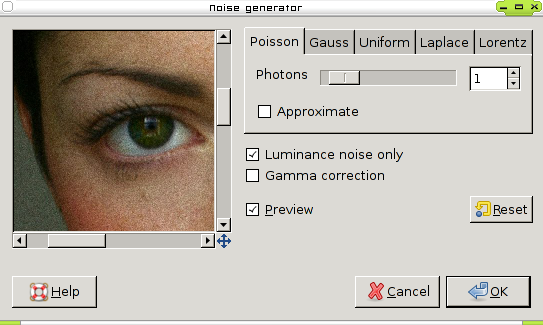
Noise types
Here the different noise types are described. The histogram of each noise type is a real application of the filter on a neutal gray image (128).
Poisson noise
A source for Poisson noise is photon counting. When taking a picture in the real world photons (light particles) arrive at a certain rate. However photons are not correlated and thus the time between photons is not always the same. Therefore given the shutter time of your camera and a photon rate you may collect more or less photons in subsequent pictures. The number of photons you actually collect is Poisson distributed.
Calculating poisson distributed random numbers takes a lot of time, especially for bright pixels and many photons. You can decrease computation time by selecting "Approximate" which approximates the Poisson distribution with a Gaussian distribution with the correct variance. As you can see in the histogram, Poisson noise closely resebles Gaussian noise. However, there is an important difference in for dark image values!
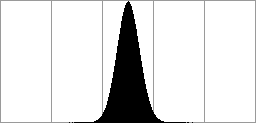
You can see the difference to Gaussian noise in the stepwedge below.

Gaussian noise
In nature nearly everything is normally distributed. Normally distributed noise is Gaussian noise. It appears in image from thermal noise in the amplifier and other effects. An important aspect of Gaussian noise is that its variance does not depend on the intensity of the image.
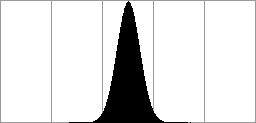
Uniform noise
Uniform noise rarely occurs in nature but when digitizing a signal errors take place that are uniformly distributed. Like Gaussian noise the noise variance is independent of the image intensity.
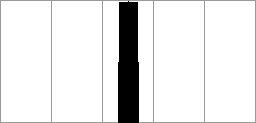
Laplace noise
Laplace noise has a double exponential distribution. The scale parameter determines the width of the distribution.
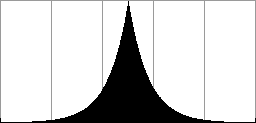
Lorentz noise
Lorentz noise has Cauchy-Lorentz distribution which describes resonances and decays very slowly. This is a so called fat-tail distribution and causes here salt-and-pepper noise.
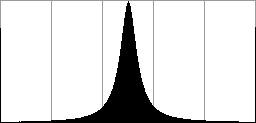
Comparison between noise types
In the images below the noise variance is the same for all noise types at a brightness of neutral gray (128) except for Lorentz noise where the variance is not defined.
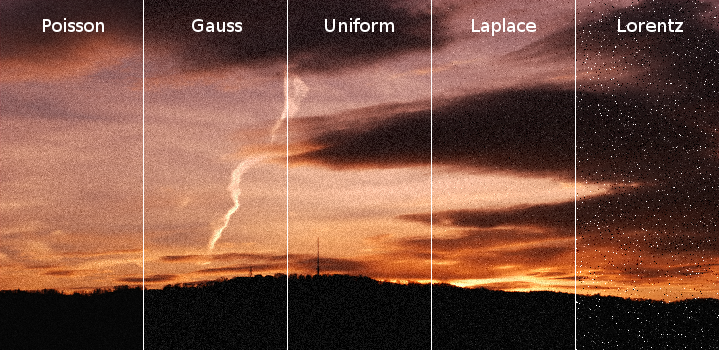
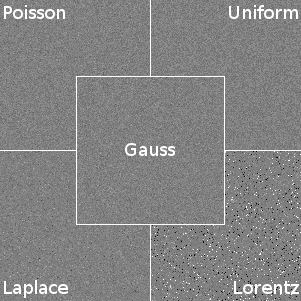
| Attachment | Size |
|---|---|
| 13.46 KB | |
| 20.82 KB |
- Log in to post comments

Comments
plugin for win 64bit
Hi,
Where can I download this plugin for windows 64bit?
Thanks,
micshi
Can not download
I can't download this plugin for Win64.
Funny download
I can't download this plugin, Help me....
Error when I try to use make command
Hi,
I get the following error when I use sudo make:
/usr/bin/ld: note: 'exp@@GLIBC_2.2.5' is defined in DSO /lib/x86_64-linux-gnu/libm.so.6 so try adding it to the linker command line
/lib/x86_64-linux-gnu/libm.so.6: could not read symbols: Invalid operation
collect2: error: ld returned 1 exit status
make[1]: *** [poisson-noise] Error 1
Thanks
Noise generator - Binaries Gimp 64 bits Windows
Bonjour,
http://www.aljacom.com/~gimp/noise-generator-0.2.5_poisson-noise-0.1b-64...
907 706 bytes.
noise-generator-0.2.5_poisson
noise-generator-0.2.5_poisson-noise-0.1b-64bits.zip
file not found!
Noise generator 0.2.5 release
I couldn't install it
My brain is locked...